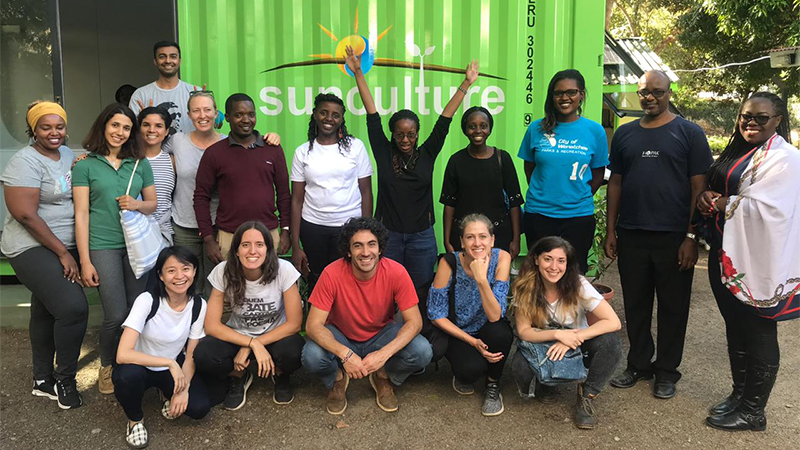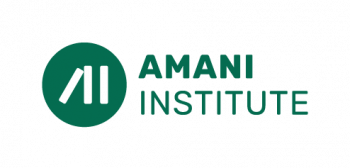A common saying in show business is, “show, don’t tell.” The same maxim applies to social innovation. For each Social Innovation Class, we organize a Social Innovation Safari (Swahili word for “tour/travel”) – a tour to showcase to Fellows innovative social enterprises working in different sectors in Nairobi, Kenya.
In early April, Fellows from the current Kenya Social Innovation Management Class (10) went on a tour of four different social enterprises in Nairobi. The Safari is meant to showcase 4 key dimensions of social impact work:
- To show the spectrum of different ways to be a social impact organization (from NGO to enterprise, on field or not).
- To emphasize the need for collaboration with people with different perspectives to achieve systemic change.
- To see the concepts taught in class (especially Amani Social Innovation Framework) in action.
- To be aware of the challenges of changemaking and the grit needed to shepherd social transformation.
Where We Visited
Sanergy – was the first pit stop in the Kenya Social Innovation Safari. Founded in 2011, Sanergy is addressing the huge deficit in adequate Water, Sanitation and Health (WASH) facilities for Nairobi’s ever-growing population. 66% of waste in Nairobi is not treated – a huge health threat to Nairobi’s population of over 4 million. This deficit makes it essential to innovate and come up with context sensitive solutions. Through their novel Fresh Life toilets, Sanergy has helped enhance access to hygienic sanitation facilities for over 90,000 people living in Mukuru slums in Nairobi whilst also employing people in the informal settlements in latrine maintenance. A new innovation that has been introduced by Sanergy is the Mtaa Fresh pit latrine emptying service which has helped minimize waste into rivers as well as reducing prevalence of water borne diseases.
Gearbox is a hardware makerspace that provides a technical support system for innovators . For developing countries, research and development is critical for development. However, in most cases access to machinery, training and a community dedicated to hardware development is a challenge in Sub-Saharan Africa. Since its inception in 2011, Gearbox has helped innovators in technical fields refine their solutions and consequently develop viable products.
Tunapanda Institute provides young people in Kibera – the biggest informal settlement in Nairobi – with access to affordable technology, design and business training courses. For many young people living in Kibera, the skills derived from their training has has given them the chance to earn a living as well as help improve the outlook on life for their families with a profound impact on the community, too.
The last stop on the Social Innovation Safari was Sunculture. One of the biggest resources in Kenya is solar energy. Given the fact that agriculture is the biggest economic activity in the country, Sunculture have designed innovative water pumping solutions that harness solar power for irrigation. This has consequently helped to enhance productivity of farmers through the provision of a regular supply of water for crop cultivation.
Top Takeaways from the Safari
For Changemakers, understanding local context is key
From the site visits, one of the things that was very evident was the aspect of designing solutions based on the immediate context to ensure sustainability. Sanergy looked at how do they offer sanitation solutions in areas with little or no pre-existing infrastructure. Tunapanda did an incredible job of looking at the environment and pricing their products in such a way as to get as many participants as possible in a challenging social environment. Whichever the industry, it is a prerequisite to take time, study the local context and then design solutions based on learnings gleaned from the scoping study.
Value of partnerships/Community in changemaking
In the field of changemaking, we should always look to leverage the skills, networks and resources that are availed particularly with project partners. Over the years, Gearbox has created a vibrant community of innovators involved in hardware development where they can share knowledge and resources. Sanergy, in looking to establish the FreshLife toilets in slums, considered how they could partner with the community. Through their sensing phase, they managed to learn which sanitation solutions could work and then developed prototypes which evolved into established products.
Impact is Relative/Do not Compare Impact
One of the questions that changemakers often ask themselves is “am I doing enough?” This is a valid question but often times this question is rooted in comparison with the work others are doing. From what we have surmised, impact is always measurable but relative. Sanergy is doing a great job of providing sanitation for over 90,000 people in Nairobi but so is Tunapanda Institute who have trained over 300 youths to code in Kibera and Turkana. Depending on the context, resources available and the resultant solutions developed, impact quantitatively can differ. However, what is most important is the thought process and desire to improve communal welfare via the innovations we come up with.





